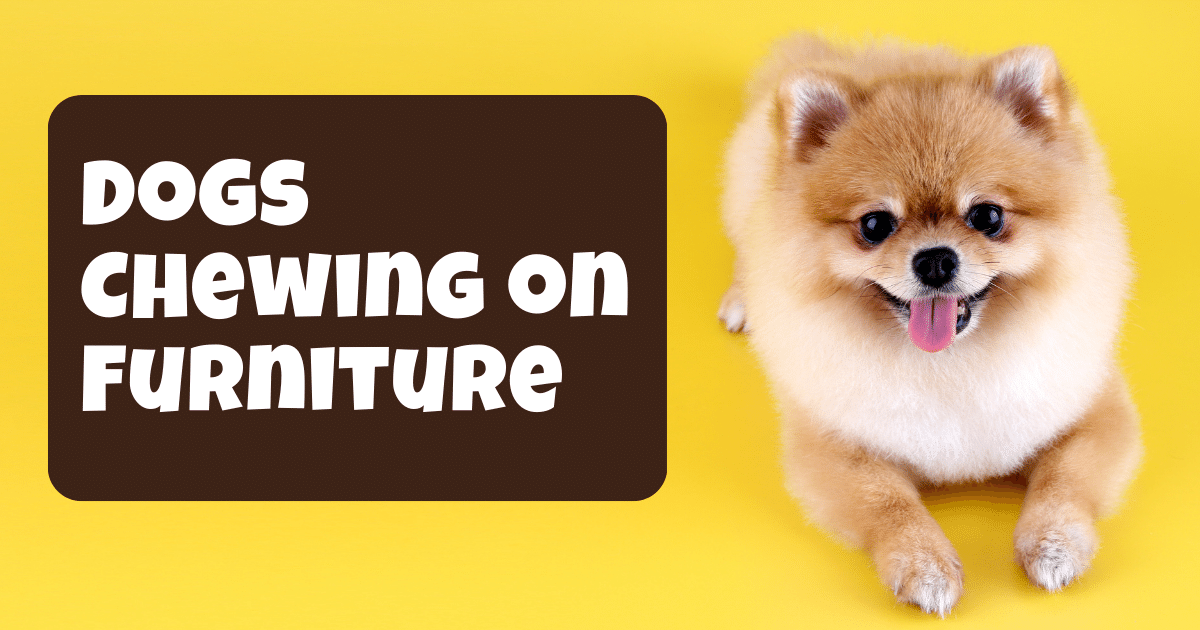Uncategorized
How to Stop Dogs from Chewing on Furniture: Effective Solutions and Tips
Introduction
Dogs are lovable companions, but their natural instinct to chew can sometimes lead to destructive behavior, especially when it comes to our furniture. If you’ve ever come home to find your favorite couch cushions in shambles, you’re not alone. Fortunately, there are strategies you can employ to put an end to this behavior and protect your furniture from further damage. In this article, we will explore effective solutions and provide valuable tips on how to stop your dog from chewing on furniture. So let’s get started!
How do I stop my dog from chewing on furniture when left alone?
One of the most common situations where dogs tend to indulge in furniture chewing is when they are left alone. Separation anxiety, boredom, or teething can contribute to this behavior. To address this issue, consider the following tips:
- Provide appropriate chew toys: Offer a variety of safe and durable chew toys to redirect your dog’s attention from furniture to more suitable objects. Choose toys that are specifically designed for strong chewers, such as Kong toys or sturdy rubber bones.
- Use positive reinforcement: Reward your dog with praise, treats, or interactive play whenever they choose to chew on their toys instead of furniture. Positive reinforcement helps to reinforce the desired behavior and creates a positive association with appropriate chewing.
- Gradually increase alone time: If your dog exhibits severe separation anxiety, gradually increase the duration of time they spend alone. Start with short periods and gradually extend them, making sure to provide engaging toys and mental stimulation to keep them occupied.
What causes dog chewing?
Understanding the underlying causes of furniture chewing can help you address the problem more effectively. Here are a few common reasons why dogs engage in this behavior:
- Teething: Puppies often chew on furniture during their teething phase to relieve discomfort and help their adult teeth break through. Ensure they have access to appropriate teething toys and discourage chewing on furniture by redirecting their attention.
- Boredom or excess energy: Dogs are active animals that require mental and physical stimulation. When left alone for extended periods without adequate exercise or mental engagement, they may resort to chewing as a way to relieve boredom or burn excess energy.
- Anxiety or stress: Dogs with separation anxiety or other forms of anxiety may chew on furniture as a coping mechanism. Identifying and addressing the root cause of their anxiety through training, behavior modification, or seeking professional help can help alleviate the destructive chewing behavior.
Is it possible to stop dogs from chewing couch?
Yes, it is possible to stop dogs from chewing on the couch with consistent training and appropriate interventions. Here are a few strategies to consider:
- Provide alternative chewing options: Offer a variety of dog-friendly chew toys and bones that are more enticing than the couch. Rotate the toys regularly to keep them interesting for your dog.
- Use deterrents: Apply pet-safe deterrent sprays or double-sided tape to the areas of the couch that your dog is prone to chewing. The bitter taste or sticky texture will discourage them from engaging in destructive behavior.
- Supervise and manage the environment: When you cannot actively supervise your dog, consider using baby gates or crate training to limit access to areas with furniture. This prevents them from forming the habit of chewing on the couch.
- Seek professional help: If the chewing behavior persists despite your efforts, consult a professional dog trainer or behaviorist who can provide tailored guidance and strategies to address the underlying causes.
Will vinegar stop dogs from chewing?
While vinegar is often touted as a natural deterrent for dogs, it is not a foolproof solution to stop them from chewing. Some dogs may be deterred by the strong smell and taste of vinegar, while others may not be affected at all. It’s important to note that vinegar should be used with caution as it can potentially stain or damage certain materials. It is best to explore other proven methods mentioned in this article for effectively curbing your dog’s chewing behavior.
Conclusion
Chewing is a natural behavior for dogs, but redirecting it away from your furniture is crucial to maintaining a harmonious home environment. By providing appropriate chew toys, using positive reinforcement, and addressing underlying causes like boredom or anxiety, you can successfully stop your dog from chewing on furniture. Remember to be patient and consistent in your training efforts. If you need high-quality pet products to help address your dog’s chewing needs, consider checking out ChimpyTrendy, where you can find a wide range of trending and durable pet products. With dedication and the right approach, you can preserve your furniture and enjoy a happy, chew-free life with your furry companion.


